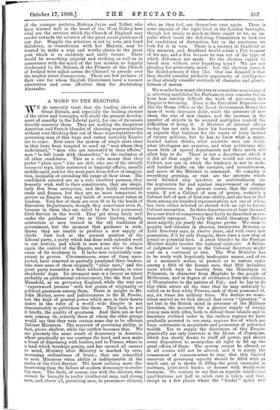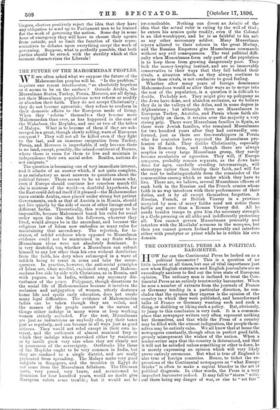A WORD TO THE ELECTORS.
WE do earnestly trust that the leading electors of Great Britain, and especially the leading electors of the cities and boroughs, will study the present develop- ment of anarchy in the Liberal party, for one of its causes directly concerns them. They are making the dangerous American and French blunder of choosing representatives without ever thinking that out of those representatives the governing men of this huge and rather unwieldy Empire are to come. Ever since the system of single seats came in they have been tempted to send up "men whom they understand," "men who are interested in their affairs,' men "in full touch with themselves," to the exclusion of all other candidates. This as a rule means that they prefer "plain men" who are rich, who are of the strictly bourgeois type, little instructed in Imperial affairs, usually middle-aged, and for the most part, from defect of imagina- tion, incapable of extending the range of their ideas. The candidates selected are as a rule excellent persons, they honestly wish well to their constituents, they are singu- larly free from corruption, and they fairly understand trade and finance, but they are no more competent to govern an Empire than any batch of vestrymen taken at random. Very few of them are even fit to be the heads of Executive Departments, though they sometimes seem fit, because in them they are aided by the best permanent Civil Service in the world. They get along fairly well under the guidance of two or three leaders, usually aristocrats or men trained in the old traditions of government, but the moment that guidance is with- drawn they are unable to produce a new supply of chiefs. Just look at the present position of the Liberal party, a party which has done such splendid work in our history, and which is sure some day to obtain again the control of the Empire, and see where the first cause of its weakness is. It lacks men indubitably com- petent to govern. Circumstances, some of them unex- pected, have removed or partially paralysed three leaders, who were none of them originally "plain men," and the great party resembles a flock without shepherds, or even shepherds' dogs. Its strongest man is a lawyer as intent probably on professional advancement, like the first Lord Mansfield, as on governing England, while the rest are experienced persons" with few grains of originality or political greatness among them. There is insight in Mr. John Morley, nerve and judiciousness in Sir H. Fowler, but the kind of general power which men in their hearts desire in the ruler of a world - wide Empire is not demonstrably in politicians like these. They lack, to put it briefly, the quality of greatness. And there are so few men coming on, scarcely three of whom the older groups would say that they were certain some day to be efficient Cabinet Ministers. The reservoir of governing ability, in fact, grows shallow, while the outflow becomes thin. We see precisely the same result of democracy in America, where practically no one overtops the herd, and men make a boast of dispensing with leaders, and in France, where in a land which worships genius, and has opened all careers to mind, Ministry after Ministry is marked by ever- increasing ordinariness of brain ; they are compelled to seek Ministers when ability is indispensable in the ranks of the Civil Service. We know nothing more dis- heartening than the failure of modern democracy to evolve big men. The fault, of course, lies with the electors, who cannot be brought to prefer intellectual men, and strong men, and, above all, promising men, to prominent citizens, who, as they feel, are themselves over again. There is some impulse of the right kind in the London boroughs, though not nearly so much as there ought to be, an im- pulse which leads the Selecting Committees to look out for candidates of distinction, but in the provinces we look for it in vain. There is a vacancy in Bradford at this moment, and Bradford would refuse a Pitt because of his age, and a Fox because he was not of the type of which Aldermen are made. Do the electors expect to breed men without ever begetting boys ? We are not pleading for aristocrats, mind. Let the electors ransack the Board-schools if they like. Our one demand is that they should consider probable superiority of intelligence as they already consider rectitude of character and plenti- fulness of means.
We wonder how many electors or committee-men engaged in selecting candidates for Parliament ever consider for an hour how terribly difficult the work of governing this Empire is becoming. Even in the Executive Departments like the Home Office or the Local Government Board the mass of work increases daily, while the pressure of new ideas, the rise of new classes, and the increase in the number of objects to be secured multiplies tenfold the difficulties of doing it. A Minister of internal affairs to-day has not only to know his business, and provide as regards that business for the wants of forty instead of twenty millions, but he has to know what a many. headed nation thinks, what scientific men are doing, what ideologues are pressing, and what politicians who know little of special departments and their needs will allow him to do. There is not a department which if it did all that ought to be done would not overtax a Colbert, nor one in which the tendency is not to make still further drafts on the energies, and inventiveness, and nerve of the Minister in command. So complex is everything growing, so vast are the interests which every forward step involves, so multitudinous are the arguments for and against improvement or change or persistence in the present course, that the country wants, if not a Cabinet of men of genius, certainly a -Cabinet full of men of first-rate ability, and she has to find them among six hundred representatives not one of whom has been either selected or elected with an eye to future Cabinet necessities. In three departments at least the need for a rare kind of competence may fairly be described as per- manently emergent. Yearly the world threatens Britain more angrily, yet yearly the Empire grows. We seem to acquire new colonies in sheaves, twenty-two Britains, as Lord Rosebery says, in twelve years, and with every new possession, if it be only Dongola, there rises a new crop of actual or potential foes. A great blunder by the Foreign Minister might involve the national existence. A failure of judgment or temper in the Colonial Secretary might cost us a continent or two. The War Minister has to be ready with hopelessly inadequate means, and of en at a moment's notice, to protect or to restore order among a fifth of the human race, that fifth including races which vary in locality from the Himalayas to Polynesia, in character from Moplahs to the people of Melbourne, and in degree of civilisation from the citizens of Westminster to the natives of Fiji ; and he has to do this while aware all the time that he may suddenly be called on to face white Powers, each of them possessed of, say, six times his military force. We declare we some- times marvel as we look abroad that every " Question " is not lost in the British mind in presence of the Military Question, the necessity for a greater supply of strong young men with rifles, both to defend these islands and to maintain civilised order in the endless regions we have gradually accreted to our sway, regions five of which are huge continents in magnitude and possession of potential wealth. Yet to supply the Governors of this Empire practically our only reservoir is the House of Commous, which has slowly drawn to itself all power, and shows every disposition to monopolise all right to fill up the great offices of State. The system cannot be altered, or at all events will not be altered, and it is surely the commonest of common-sense to urge that this limited reservoir of governing capacity should be filled with as much care as is shown in filling the great vacancies in railways, joint-stock banks, or houses with world-wide business. We venture to say that as regards intellectual qualifications not half so much care is taken, and that, except in a few places where the " feudal " spirit still :lingers, electors positively reject the idea that they have any obligation to send up to Parliament men to be trained for the work of governing the nation.. Some day in some hour of emergency they will have to choose their agents from outside, and so limit the function of their repre- sentatives to debates upon everything except the work of governing. Suppose, what is perfectly possible, that both parties should be struck with the sterility which at this „moment characterises the Liberals !







































 Previous page
Previous page